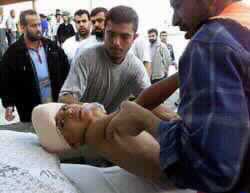Israeli tank shelling killed at least six Palestinians and wounded 60 in a Gaza Strip refugee camp Thursday after resistance men fired at army bulldozers, aggravating tensions that were already close to the boiling point. Two other people were feared dead in the wreckage of a house destroyed in the Rafah camp, said Palestinian medics. Witnesses said the bodies of two women, two young men and a 10-year-old girl were pulled from the rubble of homes. Ambulance workers, ducking at the sound of gunfire, frantically wove through narrow alleys trying to reach the wounded.
A school operated by the United Nations Relief and Works Agency, or UNRWA, which serves Palestinian refugees, and another run by the Palestinian Authority were hit by machine gun rounds fired from Israeli tanks, the agency said in a statement.
Pupils in the UNRWA boys' school had to be moved to a basement for safety, it said. There were no injuries.
The violence undermined U.S. demands for calm in the Middle East as it sought Arab support for possible war on Iraq. It erupted after President Bush put those demands to Israeli Prime Minister Ariel Sharon at talks in Washington.
HOUSES HIT
Palestinian medics and witnesses said a total of six bodies were recovered from a cluster of houses hit by Israeli shells.
"We have six martyrs," said Ali Moussa, director of the Rafah hospital, using the term to describe Palestinians killed in the uprising for independence in Gaza and the West Bank. Most of the 60 people wounded were in serious condition, he said.
Witnesses said both the dead and wounded were civilians.
Rafah, on Gaza's southern border with Egypt, has been the scene of frequent violence in the uprising and is seen by Israel as a resistance stronghold. Israel often uses bulldozers to destroy houses there, saying they are used as cover for resistance men.
The Palestinian Authority denounced the massacre in Rafah and renewed its call for international protection for Palestinians, a request opposed by Israel.
Peter Hansen, commissioner-general of UNRWA, said he was dismayed by the civilian deaths and damage to schools. "This is another case of disproportionate force being used against civilian targets, including schools full of children," he said.
Israel has recently stepped up raids on Gaza militants spearheading the revolt that began in September 2000 after talks on Palestinian statehood in the West Bank and Gaza failed.
The United States has criticized such raids when civilians have been killed and has demanded Israel ease the hardships of civilians living under curfews and blockades since it reoccupied West Bank cities after a wave of suicide bombings.
HIGH-LEVEL TALKS
The violence in Rafah began hours after Israeli Foreign Minister Shimon Peres and chief Palestinian negotiator Saeb Erekat met in Jerusalem, signaling a desire by both sides to at least maintain dialogue.
They discussed more Israeli occupation troop withdrawals from the West Bank, following a pullout from the city of Bethlehem in August, and the release of tax revenues and other funds owed to the Palestinians but withheld by Israel since the uprising started.
Israel is considering removing troops from Hebron.
"It was decided that expanded teams from the two sides will meet early next week," a Palestinian official said. Israel's Foreign Ministry called it a "preparatory meeting."
In Washington, a senior Israeli official told reporters after Sharon met Bush that Israel would not scale back military actions against resistance men and had not been asked to do so.
U.S. Assistant Secretary of State William Burns will take stock of the situation during a two-week trip to the Middle East starting Friday after a meeting in Paris with other mediators.
PHOTO CAPTION
Palestinians carry a wounded child after an Israeli shell landed in his home in Rafah refugee camp south Gaza Strip on October 17, 2002. Israeli tank shelling killed five Palestinians and wounded 45 in the Gaza Strip after resistance men had fired at occupation army bulldozers, fueling tensions that are already close to boiling point. (Ahmed Jadallah/Reuters)
- Author:
& News Agencies - Section:
WORLD HEADLINES


 Home
Home Discover Islam
Discover Islam Quran Recitations
Quran Recitations Lectures
Lectures
 Fatwa
Fatwa Articles
Articles Fiqh
Fiqh E-Books
E-Books Boys & Girls
Boys & Girls  Hajj Rulings
Hajj Rulings Hajj Fatwas
Hajj Fatwas














